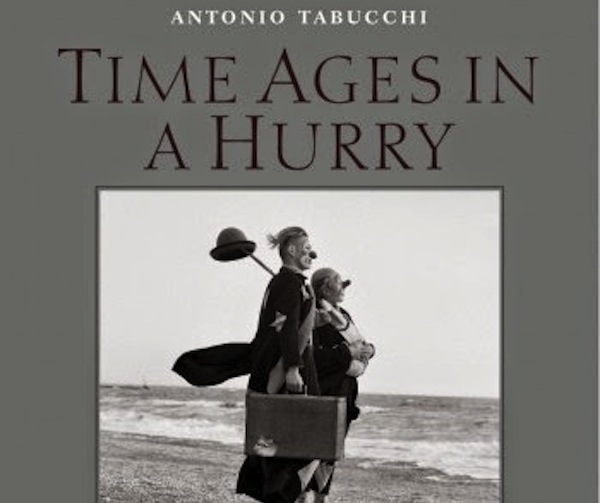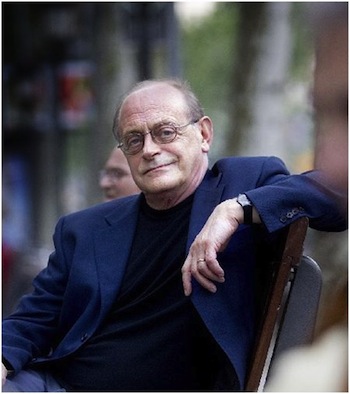Book Review: Antonio Tabucchi’s “Time Ages in a Hurry” — A Diary of Dreams
Antonio Tabucchi’s fluid style moves easily from realism to surrealism, banal conversation to poetic free association, reportage to allusion.
Time Ages in a Hurry by Antonio Tabucchi. Translated by Martha Cooley and Antonio Romani. Archipelago Books, 138 pages, $18.

By Helen Epstein
This slim and evocative volume of stories by the late Italian author, translator and academic Antonio Tabucchi (1943-2012) reads like a diary of dreams by a traveler in 21st century Europe. Its fluid style moves easily from realism to surrealism, banal conversation to poetic free association, reportage to allusion.
Antonio Tabucchi was born in Pisa. He came across the poetry of Portuguese poet Fernando Pessoa while a student at the Sorbonne and fell so deeply in love with it. He became Pessoa’s translator into Italian and ultimately a renowned scholar of Portuguese literature. For the rest of his life, he divided his time between Lisbon and Italy. Though he wrote nearly three dozen books of his own, he is said to have considered himself primarily Pessoa’s translator and a professor of literature. Many of Tabucchi’s books are themselves widely translated; three were made into films.
The 21st century European space in which Time Ages in a Hurry sits is layered in time and memories: personal, familial, cultural, literary, historical, geographical, and political. The first story, “The Circle,” begins with a memorial gathering in Geneva, where an elderly professor, “speaking French with a strong German accent,” recites lines from a verse by the Polish poet Wisława Szymborska to family members who include one of the young women who has married into the family, a Parisian whose ancestors lived in the Maghreb.
A Swiss phrase comes into her mind as she watches children gobble up a chocolate cake and then their mother wiping chocolate off her son’s face: “a healthy face of milk and blood.” That thought sends her mind back to “a childhood that wasn’t hers, to a village lost in time” and to the memory “of a grandmother she’d been told about, whom she’d never known…Why were those places of sand her mother had talked about when she was a little girl left buried in the sand of her memory? The Grands Boulevards, this was the geography belonging to her memory, the great avenues of Paris where her father had an elegant law office…”
In “The Dead at the Table,” a retired Italian intelligence agent has bought a flat in what used to be East Berlin and, since the death of his wife, spends his time walking around the city following people he designates as ‘Targets.’ Tourists in the city remind him of the many changes in Europe since the Spanish Civil War of his youth. Refugees make him think of new wars. He, like the Frenchwoman in the first story, is haunted by the past, in his case, a discovery of a secret police file with a record of his wife’s informing on him. His blood pressure is too high but when his doctor asks how he’s been sleeping, he says or thinks “How could a tranquil old man sleep badly when he had nice bank account, a magnificent apartment in the center of the city, a vacation cottage in Wannsee, a lawyer son in Hamburg and a daughter married to the owner of a supermarket chain, come on, doctor.”

Antonio Tabucchi — his episodic narratives eschew standard punctuation.
Tabucchi’s loose, episodic narratives eschew standard punctuation; dialogues are often internal or overheard or imaginary, undefined by quotation marks. His translators do little to clarify what reads as vague or abstruse; the volume’s translations have an uneven quality (the agent refers ambiguously to his “house” and then to his “apartment,” for example) and sometimes read as though they needed another draft. I have been reading Michael Henry Heim’s masterful translations from the Czech and this translation by Martha Cooley and Antonio Romani felt unreliable to me.
There is little description or characterization in these stories, but a broad spectrum of characters, from a little girl reminiscent of J.D. Salinger’s Esme from “For Esme with Love and Squalor” to the elderly and infirm. In “Bucharest Hasn’t Changed a Bit,” an old former Roumanian Jew, now retired and in an assisted living facility in Israel, complains to his professor son about the “Ukrainian” who takes care of him and understands neither his native language nor his allusions to the Conducator.
You know, my son, he went on, you can go ahead and tell your memories to others, they’re eager to listen to your account and perhaps they get everything, even the smallest nuances, but that memory will be yours and yours alone, it doesn’t become someone else’s memory just because you’ve told it to others, memories are told but not transmitted.
Possibly. I enjoyed reading these stories but did not find most of them compelling enough — short as they are — to read through in one sitting. Maybe something got lost in this translation?
Helen Epstein’s books can be found at Plunkett Lake Press.
Tagged: Antonio Tabucchi, Archipelago-Books, Culture Vulture, short stories

